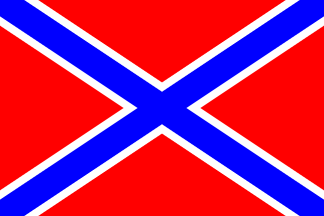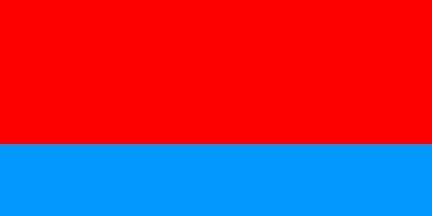 image by Tomislav Todorović, 8 Sept 2014
image by Tomislav Todorović, 8 Sept 2014derived from Imperial Flag image, which was created by Rick Wyatt

Last modified: 2023-07-08 by martin karner
Keywords: ukraine | novorossiya | russia | kiev | kyyiv |
Links: FOTW homepage |
search |
disclaimer and copyright |
write us |
mirrors
 image by Tomislav Todorović, 8 Sept 2014
image by Tomislav Todorović, 8 Sept 2014
derived from Imperial Flag image, which was created by Rick Wyatt
See also:
Anyway, the similarity of the design with that of the CSA navy jack, which is also frequently used by Russian ultra-rightist groups, must have been noticed by the leadership of Novorossiya, because a new state flag was recently adopted, the old one being kept in use as the war flag.
In the video, old and new flags
of Novorossiya are visible all the time as the table flags, but
the presentation of new state flag and new war flag (old state
flag) begins about @6:50. Since the presentation date was
2014-08-13, it can be considered the adoption date as well, until
more information is available.
Tomislav Todorovic, 8 September 2014
Novorossiya formally called (Federal State of Novorossiya) has its
current flag called the
Federal State Flag. It was adopted on August 13, 2014 (as mentioned by
Tomislav Todorovic above). It was presented by the
speaker of its parliament Oleg Tsarev. It resembles the Romanov flag,
the national flag of the Russian Empire from 1858 to 1883.
Novorossiya is an unrecognised confederation of the Donetsk
and Lugansk People's Republics, claiming the territory of the respective
Donetsk and Luhansk Oblasts in the Donbass
region of eastern Ukraine.
On 15 May 2014 the Russian on-line newspaper Vzglyad (Russian: взгляд)
(www.vz.ru) noted that the then Governor of the Donetsk
People's Republic, Pavel Gubarev, had announced the start of voting
for a flag of the proposed state of Novorossiya. As of 11 July 2014
the Novorossiya website invites its readers to vote for one of eleven
proposed flag designs for New Russia – with Option 1 the red-blue
Saint Andrew's saltire.
Following the adoption of the white-yellow-black tricolour as the
national flag, the saltire was then adopted as the War Flag of the
Republic.
The former flag, the saltire, was adopted first on May 24, 2014 as
national flag and later on August 13, 2014 as war flag (and also as flag for the United
Armed Forces of Novorossiya). The flag bears a strong, striking
resemblance to that of the Confederate States of America's navy jack
and battle flag (again, something that Tomislav Todorovic pointed out
above). However, Pavliv explains that he had simply
stumbled upon the flag online somewhere, and that the leader of the
New Russia Party, Pavel Gubarev, later picked it up. Gubarev has since
stated that the inspiration for the flag came from "banners used by
Cossacks who reclaimed the New Russian territories from Tatars and
Turks for Russia in the 18th century"; however according to Alexey
Eremenko of the Moscow Times, no Cossacks ever used a flag resembling
the one chosen. (source)
Antonio Martins mentioned as early as August 15, 1999 that
"Novorossiya" (HOBOPOCCNR) means "New Russia". This New
Russia name was actually picked and a political party was established
as well, the New Russia Party (Russian: Партия Новороссия;
Partiya Novorossiya), is a political party in Ukraine founded by Russian
separatists, under the leadership of Pavel Gubarev on May 13, 2014 as
the "Social-Political Movement – Party of New Russia" in Donetsk. The
emblem of the party
actually bears the name HOBOPOCCNR and the party flag is also the war flag of Novorossiya (the
country). The New Russia Party plays an important role in the politics of
unrecognized Federal State of Novorossiya. The prospective government
structure and political programme of the new unrecognized state were
outlined in the official programme of the New Russia Party, proclaimed
at Donetsk and published online on 23 May 2014. (source)
The United Armed Forces of Novorossiya, formerly the Donbass People's Militia
and the Army of the South-East, are both militias
and armed volunteer groups affiliated with the Union of Novorossiya. It is regarded as
a terrorist group by the Ukrainian government. When it was called
"Donbass People's Militia", it was mostly active in the Donetsk Oblast.
The United Armed Forces of Novorossiya were formally established on
March 3, 2014 and the armed wing of the Lugansk People's Republic,
the Army of the South-East, was
"United Armed Forces of Novorossiya".
The flag of the United Armed Forces of Novorossiya is thus the saltire
(or St. Andrew's Cross), seen here (the flag is seen
in this BBC news video at
2:50 toghether with the flag of the Donbass Militia flag).
Esteban Rivera, 21 October 2014
The denomination is "Newrussia" (Ukrainian: Новоросія).
A movement, first started as a political party (May 22, 2014) was
quickly declared
a new government, when the Donetsk People's Republic
(DPR) and the Luhansk People's Republic (LPR) signed a document
(most likely a
MOU, Memorandum of Understanding) on May 24 which is
considered the foundation date. Furthermore, the announcement of the
establishment of a "People's Front" or "Popular Front" between Russian and Ukrainian
activists, political movements and parties as well as
unions, was to be set up to further
support this cause (source, source).
The location was intended to be much larger than it currently is,
according to its leader Pavel Gubarev (who is the leader of the
People's Militia of Donbass, and who put it first on his Facebook profile,
after which it was seen in printed media), also acknowledging the fact that both current breakaway
Republics, DPR (April 7, 2014 – February 24, 2022)
and LPR (April 27,
2014 – February 24, 2022) are considered de facto defunct due to the
ongoing Russian invasion of Ukraine (2014/2022 – onwards) conflict.
This entity was in existence between May 24, 2014 until May 18, 2015
when the so called "project Newrussia" was halted indefinitely,
attempted to be revived shortly
on June 15, 2016 although completely discarded (source).
They first used the St. Andrews cross (blue) / Russian Naval Ensign,
but then the Novorossiya (red and blue). There was a
variant in use
featuring the name (inscription on top in Ukrainian)
(source).
The LPR was first displayed to the public on May 9, 2014
(source).
The now Novorossiya (Former Flag) was adopted on May
31, 2014 and was designed by Maxim Pavlin
(source).
Please see also Lugansk People's Republic (Ukraine) Overview.
Esteban Rivera, 3 July 2023

I'm attaching a picture of a rally in Ukraine. Please note the "Red St
Andrew's Flag". I hadn't seen that flag before. There are many
other flags, some already known, others not so. I'm enclosing
also my rendition of the said flag and that of the Airborne Troops
with a yellow parachute.
HB, 1 June 2014
The "Red St Andrew's Flag" is of course the Novo Rossiya flag we have been
seeing.
Rob Raeside, 1 June 2014
1)  image by António Martins, 19 October 2000
image by António Martins, 19 October 2000
2)  image by Jarig Bakker, 6 July 2001
image by Jarig Bakker, 6 July 2001
The Russian ethnic republic in Ukraine was named Novorossiya
and was proclaimed c. 1992 but fall some days after. Flag of red
with Ukrainian colors below could be used but is not confirmed
(some reports from Ukraine say that the Russian hoisted also old
Ukrainian SSR flag without hammer and sickle at a larger collection of
flags with the Russian colors in several arrangements) No more
details are known to me.
Jaume Ollé, 14 August 1999
"Novorossiya" (something like HOBOPOCCNR) means
"New Russia". Quite inappropriate, considering that
deepest roots of Russian history are found precisely in the
territory of nowadays Ukraine ...
Anyway, was this "republic" supposed to be a part of
newly independent Ukraine (like the current status of Crimea), a
genuine independent state, or an escape to grab territory from
Ukraine to Russia? And where was it territorially based, if
anywhere in special? (I guess that in NE Ukraine).
Flag of red with Ukrainian colors below can be used but I doubt
it: The 2R-1B-1Y horizontal would have been preferred by
moderated Ukrainian communists. The old Ukrainian SSR flag
without hammer and sickle at a larger collection of flags with the Russian
colors in several arrangements is more probable, like the flags
used by the Russian population of Crimea –
probably the same people waving the same flags, after all, this
"Novorossiya" would include Crimea, where Ukrainians
are minority.
António Martins, 15 August 1999
The name refers to the territory along the Black Sea
coast – now partly in northeastern Ukraine – that was annexed from
Turkey between 1774 and 1792 and actively colonized by ethnic
Russians (and also Germans) in the late 18th – early 19th
century. It does not include the area around Kiev (or Kyyiv, if you're Ukrainian), which
was the heartland of the first Russian state (Kievan Rus).
Joseph McMillan, 16 August 1999
It is the area of the current regions of Zaporizha
and Kherson (so I guess you mean
southeastern Ukraine then), by the Sea of Azov.
António Martins, 17 August 1999